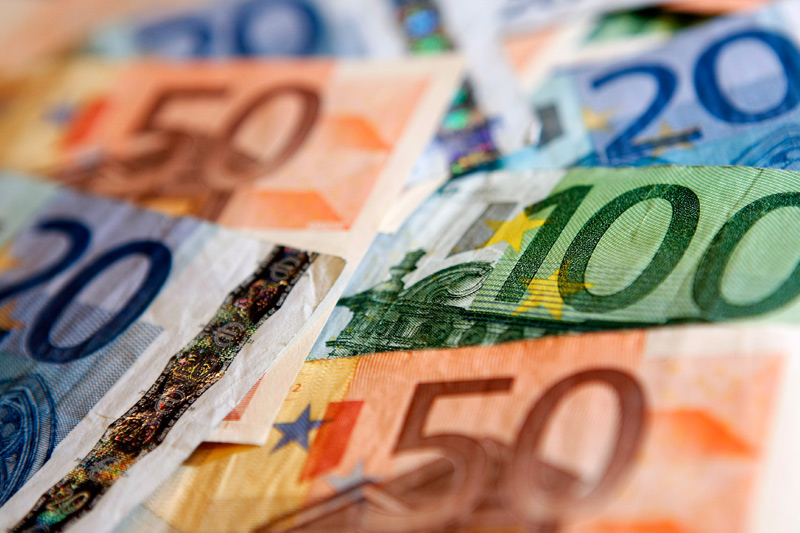Investing.com - The euro pushed higher against the U.S. dollar and the yen on Tuesday, as concerns over the logistics of Spain’s bank bailout plan eased but sentiment on the single currency remained fragile amid sustained concerns over Spain and Greece.
During European late morning trade, the euro was trading close to the session high against the U.S. dollar, with EUR/USD up 0.30% to trade at 1.2519.
The euro found support as market sentiment firmed up, but investors remained wary of pushing the single currency too high as questions remained over the source of Spain’s rescue funds and whether the bailout repayments would add to the country’s already high borrowing costs.
The yield on Spanish 10-year bonds climbed to 6.65% earlier, hovering close to the critical 7% threshold, which is seen as unsustainable in the long term.
Investors also remained jittery ahead of Sunday’s general election in Greece, which could decide the course of the country’s future in the euro zone.
The single currency was also up against the yen, with EUR/JPY adding 0.40% to trade at 99.55.
The yen weakened against the euro and the dollar earlier after the International Monetary Fund said the yen was "moderately overvalued," and indicated that it supported Japan’s view on yen weakening interventions, given current market conditions.
The euro was fractionally higher against the pound, with EUR/GBP edging up 0.02% to hit 0.8061.
Earlier Tuesday, official data showed that manufacturing output in the U.K. fell 0.07% in April, disappointing expectations for a more modest 0.2% decline and fuelling speculation over a fresh round of easing from the Bank of England.
Elsewhere, the euro inched lower against the Swiss franc, with EUR/CHF dipping 0.01% to hit 1.2009.
In Switzerland, the government revised up its forecast for economic growth earlier, saying strong domestic demand was helping to offset the damaging effects of the strong Swiss franc on the country’s export sector.
The State Secretariat for Economics said it now expected growth of 1.4% for 2012, up from a March forecast for 0.8% growth, but warned that a severe recession in the euro zone would have a knock-on effect for Switzerland.
The euro was broadly lower against the Canadian, Australian and New Zealand dollars, with EUR/CAD slipping 0.14% to hit 1.2857, EUR/AUD shedding 0.30% to hit 1.2615 and EUR/NZD falling 0.60% to hit 1.6131.
Later Tuesday, the U.S. was to publish official data on import prices as well as a government report on the federal budget balance.
During European late morning trade, the euro was trading close to the session high against the U.S. dollar, with EUR/USD up 0.30% to trade at 1.2519.
The euro found support as market sentiment firmed up, but investors remained wary of pushing the single currency too high as questions remained over the source of Spain’s rescue funds and whether the bailout repayments would add to the country’s already high borrowing costs.
The yield on Spanish 10-year bonds climbed to 6.65% earlier, hovering close to the critical 7% threshold, which is seen as unsustainable in the long term.
Investors also remained jittery ahead of Sunday’s general election in Greece, which could decide the course of the country’s future in the euro zone.
The single currency was also up against the yen, with EUR/JPY adding 0.40% to trade at 99.55.
The yen weakened against the euro and the dollar earlier after the International Monetary Fund said the yen was "moderately overvalued," and indicated that it supported Japan’s view on yen weakening interventions, given current market conditions.
The euro was fractionally higher against the pound, with EUR/GBP edging up 0.02% to hit 0.8061.
Earlier Tuesday, official data showed that manufacturing output in the U.K. fell 0.07% in April, disappointing expectations for a more modest 0.2% decline and fuelling speculation over a fresh round of easing from the Bank of England.
Elsewhere, the euro inched lower against the Swiss franc, with EUR/CHF dipping 0.01% to hit 1.2009.
In Switzerland, the government revised up its forecast for economic growth earlier, saying strong domestic demand was helping to offset the damaging effects of the strong Swiss franc on the country’s export sector.
The State Secretariat for Economics said it now expected growth of 1.4% for 2012, up from a March forecast for 0.8% growth, but warned that a severe recession in the euro zone would have a knock-on effect for Switzerland.
The euro was broadly lower against the Canadian, Australian and New Zealand dollars, with EUR/CAD slipping 0.14% to hit 1.2857, EUR/AUD shedding 0.30% to hit 1.2615 and EUR/NZD falling 0.60% to hit 1.6131.
Later Tuesday, the U.S. was to publish official data on import prices as well as a government report on the federal budget balance.
